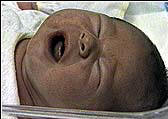Whose Body, Whose Rights?
Examining the Ethics and the Human Rights Issue of Infant Male Circumcision
PBS (Public Broadcasting System) U.S.A. Documentary 1995
From the U.S. website at http://www.circumcisionvideos.com
"In a new era of children's rights, this independently produced two-part social issue documentary compassionately explores genital mutilation of unconsenting children, euphemistically termed "circumcision." It boldly and responsibly addresses these vital issues long overdue for inner reflection and cultural self-examination:
- history and medical ethics
- consequences of circumcision
- evolving religious attitudes
- legal and constitutional issues
- foreskin functions
- men's awareness and uncircumcision
- medical conscientious objection
- children's rights
Recipient of the Creative Excellence award at the 1996 U.S. International Film and Video Festival, Honorable Mention at the 1996 Philadelphia Film Festival, and Best of Festival at the First Annual Stark Video & Film Festival (1997)."
"Whose Body, Whose Rights? will compel every health care professional, especially doctors and nurses, in taking to heart their oath - Do No Harm."
- Norma Wilcox, RN, University of California at San Francisco Medical School
"I had presumed that men upset by their circumcision had a mental disorder. That impression was dispelled by this video's wealth of factual data about truly natural male sexual functioning and its rational look at some of the very adverse outcomes caused by circumcision."
- Louanne Cole, PhD, Sex therapist and San Francisco Examiner "Sex Matters" columnist
"I know that stopping genital mutilation is the single most important thing we can do to insure the physical and psychological health of men."
- Jed Diamond, LCSW, author, The Warrior's Journey Home: Healing Men, Healing the Planet
"Teachers of male health and sexuality courses will find this to be a valuable tool that raises important questions concerning the right of males to make informed decisions about their own bodies."
- Jan Zlotnick, RN, Health Educator, City College of San Francisco
"Whose Body, Whose Rights? reveals the painful human rights realization that reproductive integrity and sexual health are repeatedly violated through destructive sexual surgeries attacking the most vulnerable members of society."
- Professor Anastasios Zavales, Reporting Officer to the UN Working Group of International Experts on Violations of Genital Mutilation
"This film focuses squarely and necessarily on the question: Does a child's body belong to his parents or to him?"
- Jim Senter, Executive Director, National Child Rights Alliance
"A unique, eye-opening film that reveals an issue too often ignored - infant pain. It should be seen by all practitioners and students in the fields of psychology and psychiatry."
- David Chamberlain, PhD, President, Association for Pre- & Perinatal Psychology and Health
A video excerpt of Whose Body, Whose Rights? is provided on their website.





